Correlation studies on seed quality traits in diverse genotypes of finger millet (Eleusine coracana (L.) Gaertn)
Bạn đang xem bản rút gọn của tài liệu. Xem và tải ngay bản đầy đủ của tài liệu tại đây (259.74 KB, 8 trang )
Int.J.Curr.Microbiol.App.Sci (2019) 8(9): 737-744
International Journal of Current Microbiology and Applied Sciences
ISSN: 2319-7706 Volume 8 Number 09 (2019)
Journal homepage:
Original Research Article
/>
Correlation studies on seed quality traits in diverse genotypes
of finger millet (Eleusine coracana (L.) Gaertn)
Shivangi Negi1*, Vineet Kumar2 and Abhishek Panwar1
1
Department of Seed Science and Technology, VCSG University of Horticulture and Forestry,
Bharsar (Uttarakhand), India
2
Department of Crop Improvement, VCSG Uttarakhand University of Horticulture and
Forestry, Bharsar (Uttarakhand), India
*Corresponding author
ABSTRACT
Keywords
Genotypes, finer
millet, variance,
vigour, germination,
correlation
Article Info
Accepted:
10 August 2019
Available Online:
10 September 2019
The thirty-five diverse genotypes of finger millet including three checks
viz., PRM-1, PRM-2 and VL-149 for seed quality parameters at seed testing
laboratory of the department of seed science and technology, College of
Forestry, Ranichauri Campus, V. C. S. G. Uttarakhand University of
Horticulture and Forestry. The data on 14 quantitative traits viz., first count,
standard germination, root length, shoot length, seedling length, seedling
fresh weight, seedling dry weight, relative growth index, vigour index-I and
vigour index-II were collected randomly from 10 seedlings form each
genotypes. Genotype IC-308884 was highest for seedling length, vigour
index-I and vigour index-II. Genotype IC-354383 was observed maximum
germination percentage and relative growth index. Analysis of variance
revealed highly significant among the germplasm for all the characters.
Correlation studies revealed that all the traits of seed quality were
associated with each other in terms of vigour. Seedling vigour-II exhibited
very strong and positive correlation with seedling dry weight, seedling
fresh weight and seedling vigour index-I while seedling vigour index-I
showed highly significant and positive correlation with seedling length,
root length, shoot length and standard germination. It is manifest that
before assessment of seedling vigour, standard germination and seedling
dry weight of the seed lots in any genotype could be used to envisage the
yield potentiality of that genotype in open field conditions.
737
Int.J.Curr.Microbiol.App.Sci (2019) 8(9): 737-744
The rate and degree of seedling establishment
are extremely important
factors in
determining both yield and time of maturity
(Briggs & Aylenfishu, 1979). Therefore, seed
quality evolution is essential for a plant
breeder to enhance the yield. Seed is the
essential element in agriculture upon which
the success of any crop production
programme depends. Thus, seed quality
testing has a great importance for the
evaluation of varietal superiority in the given
environment (Kumar et al., 2015). Laboratory
seed tests aim to provide accurate and
reproducible guidance, rather than absolute
answers or predictions. Viability, germination
and vigour tests all produce results that are
usually greater than, and at best equal to, how
the seed will actually perform in the field. An
appreciation of what viability, germination
and vigour measure can help and maximize
the understanding of the planting value or
storage potential of seed (Kumar et al., 2017).
Introduction
Finger millet locally known as “Ragi” or
“Madua” (Eleusine coracana L.) is the most
important among small millets and possesses
the potentialities to be exploited to meet
crying need of dry land farmers (Kumari et
al., 2015). Finger millet (Eleusine coracana
(L.) Gaertn. 2n=4x=36) belongs to the family
Poaceae, and is widely cultivated in the arid
and semi-arid regions of the world. The term
Eleusine is derived from Eleusis, an old epic
city sacred to Demater, the greek deity
presiding over agriculture. The term coracana
is derived from kurukkan, the singhali name
of the grain. It is cultivated mostly as a
rainfed crop for its valued food grains, dry
fodder and adaptability to wide range of
geographical
areas
(Ulaganathan
and
Nirmalkumari, 2014). Ragi is commonly
called as “Nutritious millet” as the grains are
nutritionally superior to many cereals. It
contains almost all the nutrients like protein
(9.2 per cent), carbohydrates (76.32 per cent)
and fat (1.29 per cent). It is very rich in
minerals (2.70 per cent) such as calcium
(452mg/1000g), iron (3.90 mg/100g) and ash
(3.90 per cent) which are the core ingredients
of normal human diet (Pandey and Kumar,
2005; Negi et al., 2017). Being rich in
protein, iron and calcium, finger millet severs
as an important staple food for rural
populations in developing tropical countries
where calcium deficiency and anaemia are
widespread (Owere et al., 2015).
Materials and methods
The experiment material for the present study
was taken to evaluate thirty-five genotypes of
finger millet including three checks PRM-1,
PRM-2 and VL-149. The experiment was
conducted in the seed testing laboratory of the
Department of Seed Science and Technology,
College of Forestry, V. C. S. G. Uttarakhand
University of Horticulture and Forestry. In the
present study fifty seeds in four replication
were germinated on top of the paper at 250C
in seed germinator for 14 days. The papers
were moistured with 0.2% KNO3 solution
instead of water to break seed dormancy
(ISTA, 1996). At final day of germination
normal seedling counted which determine the
germination percentage. For the determination
of seedling length. Ten seedlings were taken
from each replication in all the treatment.
Theses seedlings were measured with help of
scale. Seed vigour index determined with the
multiplication of seed germination and
High quality seed is essential and desirable to
ensure good crop establishment. For many
field crops, one of the main problems
observed is poor crop stand establishment of
which is influenced by seed quality, adverse
climatic condition, poor field management
etc. (Maiti et al., 2002). Establishment of
seedling is extremely important in
determining the yield of crop in short period
of time (Misra, 1990 and Misra et al., 2002).
738
Int.J.Curr.Microbiol.App.Sci (2019) 8(9): 737-744
seedling length. For the determination of
seedlings vigour 10 seedlings in each
replication in all the varieties were dried at
800C for twenty four hours in oven. The
standard germination test was conducted
according to rule of International Seed
Testing Association and normal seedlings
were expressed as percent germination. Seed
vigour index was calculated according to the
method (Abdul and Anderson, 1973).
makeup of each genotypes. Similar results
also reported by Krishnanappa et al., (2001)
from 23.00 % to 86.0 % in finger millet and
Tzortzakis (2009) from 73.00 % to 91.00%,
Kumar et al., (2015) from 44.25 % to 93.75 %
in grain amaranth.
Correlation studies
Correlation coefficient which provides
symmetrical measurement of degree of
association between two variables or
characters, help us in understanding the nature
and magnitude of association among yield
and yield components. The assessment of
seed viability and vigour traits by growing the
seed samples of different genotypes in the
laboratory condition before sowing in main
field and further estimation of performance in
field conditions enables to establish
relationship between seed quality parameters
and field performance. With the help of such
relations, the potentiality of seed lot of a
genotype could be assumed in advance
(Panwar et al., 2018). The estimates of
correlation coefficients among different pairs
of seed quality traits have been presented in
Table 3.
Result and Discussion
Analysis of variance
Analysis of variance revealed highly
significant among the germplasm for all the
characters such as first count (%), standard
germination (%), shoot length (cm), seedling
length (cm), seedling fresh weight (g),
seedling dry weight (g), relative growth index
(RGI), seedling vigour index-I and seedling
vigour index-II were presented in Table 1.
The mean for the characters were
significantly different for all finger millet
genotypes.
Mean performance of genotypes for seed
quality traits
The results showed that seedling length
exhibited highly significant and positive
correlation with root length (0.9484), shoot
length (0.8860) and significant positive
correlation with first count (0.3746) and
standard germination (0.3479) while seedling
vigour index-II showed highly significant
positive association with seedling dry weight
(0.9338), seedling fresh weight (0.6010),
seedling vigour index-I (0.4672) and
significant positive association with root
length (0.4148), seedling length (0.3859) and
standard germination (0.3741).
The genotypes IC-308884 was highest for
seedling length, vigour index-I and vigour
index-II while the genotype IC-354383 was
highest for maximum germination percentage
(), relative growth index and mean daily
germination. The mean value of various
quality parameters for finger millet genotypes
in given in Table 2.
The germination per cent one of the most
important characteristics of seed to be used
for estimation of planting value. Germination
seems to be biological process depending on
several factors including the differential
behaviour of genotypes.
Relative growth index (RGI) showed highly
significant and positive correlation with first
count (0.9286) followed by standard
germination (0.6640), seedling vigour index-I
The difference might be due to the genetic
739
Int.J.Curr.Microbiol.App.Sci (2019) 8(9): 737-744
(0.5421) and significant positive correlation
with shoot length (0.3569) and seedling
length (0.3478).
(0.7273) while shoot length possessed higher
positive and significant correlation with root
length (0.6958) and significantly positive
correlation with first count (0.3794) and
standard germination (0.3727). Seedling fresh
weight showed highly significant and positive
association with seedling length (0.4578) and
root length (0.4555). However, root length
observed significant positive association with
first count (0.3271). Similar results were also
observed by Yadav and Dhankar, 2001;
Deshraj, 2002; Punia et al., (2006); Kumar et
al., (2017) and Panwar et al., (2018).
Seedling vigour index–I possessed highly
significant positive association with seedling
length (0.9132), root length (0.8542), shoot
length (0.8286), standard germination
(0.6929) and first count (0.6580) while
standard
germination
showed
highly
significant and strong positive correlation
with first count (0.8808). Seedling dry weight
showed highly significant and positive
correlation with seedling fresh weight
Table.1 Analysis of Variance (ANOVA) for seed quality traits of finger millet genotypes
Characters
Degree of freedom
First count (%)
Standard germination (%)
Mean sum of square (MSS)
Treatment
Error
34
105
150.94**
2.41
165.22**
4.44
Root length (cm)
3.04**
0.00086
Shoot length (cm)
1.39**
0.00352
Seedling length (cm)
7.27**
0.00744
Seedling fresh weight (g)
0.00410**
0.000075
Seedling dry weight (g)
0.00149**
0.00000668
Relative growth index (RGI)
Seedling Vigour Index-I
Seedling Vigour Index-II
88.09**
86631.53**
11.06**
5.90
462.17
0.1261
* Significant at 0.5 % level;
** Significant at 0.0 1 % level
740
Int.J.Curr.Microbiol.App.Sci (2019) 8(9): 737-744
Table.2 Mean performance of finger millet (Elusine coracana (L.) Gaertn.) genotypes for seed quality traits
S.No.
Characters
First
count
(%)
Standard
germination
(%)
Root
length
(cm)
Shoot
length
(cm)
Seedling
length
(cm)
Seedling
fresh
weight (g)
Seedling
dry
weight (g)
Seedling
Vigour
Index-I
Seedling
Vigour
Index-II
Relative
growth index
(RGI)
38.66
41.33
29.33
35.33
36.00
30.66
26.66
37.33
40.66
37.66
28.66
33.33
45.33
25.33
52.66
33.00
36.66
34.00
40.00
42.66
34.66
32.66
31.33
34.66
47.33
86.00
88.66
76.66
78.66
79.33
72.66
70.00
82.00
85.33
86.66
70.66
80.66
89.33
71.33
96.66
82.66
84.00
74.66
84.66
88.00
78.00
73.33
74.00
83.33
91.33
5.08
5.72
6.34
6.05
5.55
5.64
5.96
6.99
5.77
5.02
4.77
4.71
6.13
4.33
7.22
4.87
5.08
6.97
6.07
4.10
5.22
5.99
6.04
6.36
7.89
3.64
4.23
3.40
4.05
3.49
3.67
3.99
4.43
4.03
3.63
2.20
3.63
4.10
3.06
3.97
3.77
4.01
4.01
3.54
3.08
3.12
4.10
3.82
3.97
5.00
8.73
9.95
9.93
10.10
9.05
9.31
9.96
11.43
9.80
8.65
6.97
8.34
10.24
7.40
11.21
8.64
9.31
10.99
9.61
7.18
8.34
10.10
9.86
10.33
12.89
0.179
0.185
0.265
0.192
0.173
0.181
0.287
0.212
0.197
0.153
0.162
0.179
0.200
0.145
0.161
0.207
0.169
0.208
0.185
0.128
0.188
0.152
0.193
0.224
0.245
0.060
0.087
0.125
0.080
0.046
0.074
0.131
0.092
0.087
0.069
0.082
0.065
0.091
0.088
0.087
0.093
0.064
0.069
0.085
0.078
0.074
0.064
0.065
0.104
0.125
751.06
882.85
761.52
794.82
717.72
677.02
690.59
937.47
836.48
750.27
493.06
673.43
914.79
528.08
1083.67
714.56
782.66
820.35
794.69
632.26
650.98
740.98
729.64
861.31
1177.85
5.16
7.01
9.58
6.32
3.67
5.40
9.10
7.62
7.47
6.16
5.82
5.52
8.16
6.27
8.47
7.74
5.38
5.15
7.20
6.86
5.79
4.72
4.67
8.69
11.47
44.62
46.62
38.25
44.96
45.40
42.16
38.51
45.56
47.72
43.03
40.70
41.31
50.75
35.53
54.47
40.88
43.66
45.72
45.83
48.49
43.64
44.57
42.35
41.65
53.89
Genotypes
1
2
3
4
5
6
7
8
9
10
11
12
13
14
15
16
17
18
19
20
21
22
23
24
25
IC-308917
IC-520490
EC-130783
IC-308905
IC-354317
IC-3522490
IC-3543177
EC-3522489
EC-522489
IC-308771
IC-354384
EC-522482
IC-354422
IC-308853
IC-354383
IC-354381
EC-522488
IC-354410
IC-308928
IC-257855
IC-257863
IC-308899
IC-308916
IC-308849
IC-308884
741
Int.J.Curr.Microbiol.App.Sci (2019) 8(9): 737-744
26
27
28
29
30
31
32
33
34
35
IC-308883
IC-308853
IC-308868
IC-308878
EC-522495
IC-354407
EC-522485
PRM-1©
PRM-2©
VL-149©
GM
CV (%)
SEM(±)
CD at 5%
Lowest
Highest
38.66
30.66
26.66
41.33
42.00
30.00
36.66
31.33
42.00
35.00
36.00
4.31
0.77
2.18
25.33
52.66
87.33
81.33
77.33
86.00
86.66
80.00
85.33
84.66
90.00
82.66
82.00
2.57
1.05
2.95
70.00
96.66
5.92
5.65
6.38
5.59
6.71
6.97
6.60
6.11
7.35
5.44
5.90
0.49
0.01
0.04
4.10
7.89
3.96
3.89
3.26
3.05
4.79
4.99
4.15
3.07
4.70
3.50
3.81
1.55
0.02
0.08
2.20
4.99
9.88
9.54
9.65
8.64
11.50
11.96
10.68
9.19
12.50
8.94
9.72
0.88
0.04
0.12
6.97
12.89
0.154
0.163
0.169
0.164
0.183
0.195
0.179
0.173
0.187
0.190
0.186
4.655
0.004
0.012
0.128
0.287
0.070
0.063
0.068
0.063
0.057
0.069
0.084
0.091
0.095
0.086
0.081
3.184
0.001
0.003
0.057
0.131
863.44
788.98
746.45
743.04
996.94
973.02
919.05
796.77
1084.78
739.41
801.43
2.68
10.74
30.14
493.06
1177.85
6.14
5.21
5.25
5.41
4.94
5.61
7.28
7.91
8.58
7.15
6.65
5.33
0.17
0.49
4.67
11.47
44.27
39.69
34.48
48.05
48.44
36.88
42.63
36.12
46.66
45.19
43.79
5.55
1.21
3.40
34.48
54.47
Table.3 Estimation of correlation coefficient between all the seed quality traits in Finger millet (Elusine coracana (L.) Gaertn.) genotypes
Characters
Standard
germination (%)
0.8808**
First count (%)
Standard germination (%)
Root length (cm)
Shoot length (cm)
Seedling length (cm)
Seedling fresh weight (g)
Seedling dry weight (g)
Seedling Vigour Index-I
Seedling Vigour Index-II
**significant at 1% level of significance
*significant at 5% level of significance
Root
length
(cm)
0.3271*
0.2886
Shoot
length (cm)
Seedling
length (cm)
0.3794*
0.3727*
0.6958**
0.3746*
0.3479*
0.9484**
0.8860**
742
Seedling
fresh
weight (g)
-0.1275
-0.1747
0.4555**
0.3560*
0.4578**
Seedling
dry
weight (g)
0.0219
0.0400
0.3162
0.1432
0.2719
0.7273**
Seedling
Vigour
Index-I
0.6580**
0.6929**
0.8542**
0.8286**
0.9132**
0.2632
0.2349
Seedling
Vigour
Index-II
0.3161
0.3741*
0.4148*
0.2614
0.3859*
0.6010**
0.9338**
0.4672**
Relative
growth
index (RGI)
0.9286**
0.6640**
0.3018
0.3569*
0.3478*
-0.0490
0.0072
0.5421**
0.2322
Int.J.Curr.Microbiol.App.Sci (2019) 8(9): 737-744
An overview of the experimental results of
present investigation indicated a wide
spectrum of variation with respect to seed
quality parameter among all the thirty five
diverse genotypes of finger millet. The
analysis of variance revealed highly
significant among the genotypes for all the
seed quality traits. Genotype IC-308884
showed highest seedling length, vigour indexI and vigour index-II among all the
genotypes. Correlation coefficient depicts that
the prior assessment of standard germination,
seedling dry weight and seedling vigour index
of the seed lot in any genotype could be used
to predict the yield potentiality of that
genotype in open field conditions.
2010. Genetic diversity in finger
millet (Eleusine coracana (L.)
Gaertn). Crop Imp. 37(1):25-28.
Kumari, S., Singh, S.K., 2015. Assesment of
genetic diversity in promising finger
millet [Eleusine coracana (L.) Gaertn]
genotypes. The Bio. 10(2): 825-830.
Maiti, R.K., Mooreno-Limon, S. 2002. Seed
and seedling traits in french bean
(Phasiolus vulgaris) and its relation to
abiotic stress resistance. Legume
Research. 24: 211-221.
Misra, A.N. 1990. Seedling vigour and
prediction of drought resistance in
pearl millet genotypes (Pennisectum
americanum L., Leeke). Beitr.
Tropisch.
Landwirtsch.
Veternarmedizin. 28: 155-159.
Misra, A.N., Biswal, A.K. and Misra, M.
2002. Physiological, biochemical and
molecular aspects of water stress
responses in plants and the
biotechnological applications. Proc.
Nat. Acad. Sci. India. 72: 115-134.
Negi, S., Kumar, V. and Bhatt, A. 2018.
Character association and path
analysis for yield and its related traits
in finger millet (Eleusine coracana
(L.) Gaertn) genotypes. J. of App. and
Nat. Sci. 9(3): 1624-1629
Owere, L., Tongoona, J., Derera, J. and
Wanyera, N. 2015. Variability and
traits relationships among finger millet
accessions in Uganda. U. J. of Agri.
Sci. 16(2): 161-176.
Pandey, P.K. and Kumar, G.S. 2005. Finger
Millet: A flair for human nutrition in
Uttaranchal. Ind. Far. Dig. 38(9): 2830.
Panwar, A., Mishra, A.C., Negi, S. 2018.
Correlation studies on seed quality,
pod and seed yield in germplasm of
pea (Pisum sativum L.). Int. J. of Bio.
S. Manag. 9(1): 98-102.
Punia, R.C., Dahiya, O.S. and Kumar, A.
2006. Exudate PH test : A quick and
References
Anderson, T.W. 1958. An introduction to
multivariate statistical analysis. John
Wiley and Sons, New York. Pp. 374.
Briggs, K.G. and Aylenfisu, A. 1979. The
effect of seedling rate, seeding date
and location on grain yield, maturity,
protein percentage and protein yield of
some spring wheat in central Alberia.
Canadian J. Plant Sci. 59: 1129-1146.
Deshraj. 2002. Studies on viability and vigour
in coriander (Coriandrum sativum L.).
In: M.Sc. Thesis, submitted to CCS
HAU, Hisar.
ISTA, 1996. International rules for seed
testing. Seed Sci. Technol. 24: 355362.
Krishnappa, N., Chandrakanthappa, Kammar,
Lokesh, K. and Narayanaswamy, S.
2001. Evalution of finger millet
varieties for seed quality characters.
Curr. Res. 39(5/6): 93-94.
Kumar, V., Malik T.P., Tehlan, S.K. and
Kumar, A. 2017.Association among
Various Seed Quality Parameters in
Coriander. Int. J. Pure App. Biosci. 5
(1): 876-883
Kumar. D., Tyagi, V., Ramesh, B. and Pal, S.
743
Int.J.Curr.Microbiol.App.Sci (2019) 8(9): 737-744
reliable
predictor
of
seedling
establishment in India Mustard
[Brassica juncea (L.) Czern and
Coss]. Natnl. J. Pl. Improv. 8(2): 103105.
Tzortzakis, N.B. 2009. Effect of pre-sowing
treatment on seed germination and
seedling vigour in grain amaranthus.
Hort. Sci. 36(8): 117-125.
Ulaganathan, V. and Nirmalakumari A. 2014.
Genetic variability and correlation
studies for quantitative traits in finger
millet [Eleusine coracana (L.)
Gaertn] germplasm. Int. Quarterly
Jour. of Enviro. Sci. 5(6): 21-25.
Yadav, S.K. and Dhankar, B.S. 2001.
Correlation studies between various
fields parameters and seed quality
traits in okra cv. Versha uphar. Seed
Res. 29(1): 84-88.
How to cite this article:
Shivangi Negi, Vineet Kumar and Abhishek Panwar. 2019. Correlation studies on seed quality
traits in diverse genotypes of finger millet (Eleusine coracana (L.) Gaertn).
Int.J.Curr.Microbiol.App.Sci. 8(09): 737-744. doi: />
744
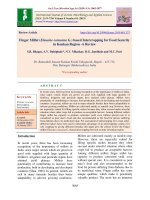
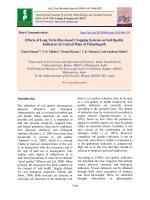
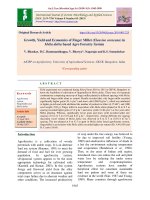
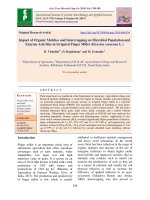

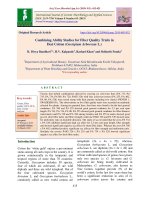



![Effect of nano ZnO on growth and yield of finger millet [Eleusine coracana (L.) Garten.]](https://media.store123doc.com/images/document/2020_01/14/medium_rzp1579000012.jpg)